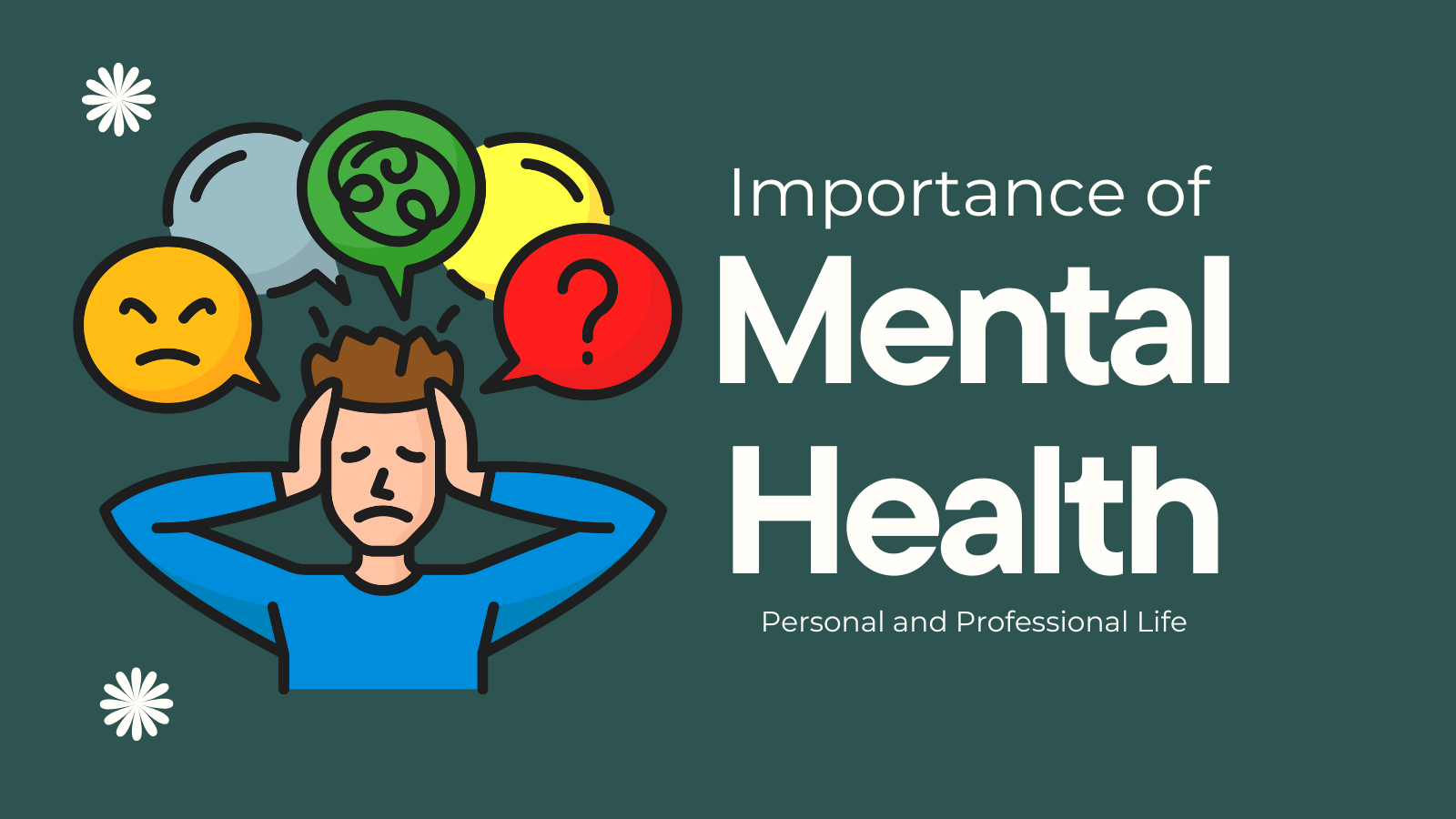Importance of Mental health is crucial to our overall health. It affects how we think, feel, and act in everyday situations. Mental health is important in every part of life, from stress management to relationship maintenance and job advancement. Unfortunatley,the part of mental health often come to light only when there are issues. This blog is on The Significance of Mental Health and reasons why it should be an agenda in personal as well as professional spectrum.
What is Mental Health?
Mental health is about a person’s emotional, psychological, and social well-being. It affects how individuals handle stress, relate to others, and make choices. Mental health includes more than just the lack of mental illness; it also pertains to overall psychological wellness. Good mental health enables individuals to:
- Cope with life’s challenges.
- Build strong relationships.
- Work productively and achieve goals.
The Current State of Mental Health Awareness
Even though awareness of mental health concerns has increased recently, stigma and ignorance continue to be significant obstacles. The World Health Organization (WHO) estimates that one in four people may deal with mental health problems at some point in their lives.
Even though it is widespread, many people are unwilling to ask for help because they fear being criticized. Promoting awareness and emphasizing the value of mental health is essential to establishing a friendly atmosphere where people feel at ease seeking assistance and thriving.
Top 5 Importance of Mental Health in Personal Life
1. Emotional Stability and Resilience
Good mental health helps individuals manage their emotions effectively. It provides the resilience needed to face challenges and recover from setbacks. Emotional stability fosters inner peace and reduces the risk of anxiety and depression.
2. Strengthening Relationships
Mental health is crucial for forming and sustaining relationships. When people are emotionally balanced, they tend to communicate more effectively, demonstrate empathy, and handle conflicts constructively.
3. Improved Self-Understanding
Understanding oneself is key to personal growth. Mental well-being encourages self-awareness, helping individuals recognize their strengths and areas for improvement.
4. Physical Health Connection
The mind and body are closely linked. When mental health suffers, it can result in physical problems like heart disease, obesity, and a compromised immune system. On the other hand, maintaining good mental health contributes to a healthier body.
5. Enhancing Overall Happiness
Mental health significantly impacts happiness and life satisfaction. It enables individuals to enjoy life, pursue passions, and find meaning in their experiences.
Top 5 Importance of Mental Health in Professional Life
1. Enhanced Focus and Productivity
Mental health directly affects productivity. A focused and emotionally stable individual is more efficient and delivers higher-quality work.
2. Fostering Innovation and Creativity
Creativity thrives in a mentally healthy environment. Clear thinking and reduced stress allow professionals to generate innovative ideas and solutions.
3. Leadership and Influence
Leaders with strong mental health inspire and motivate their teams. They make better decisions, manage stress effectively, and create a positive work culture.
4. Building Workplace Culture
A workplace that prioritizes mental health encourages collaboration, inclusivity, and mutual respect. It reduces conflicts and enhances employee satisfaction.
5. Long-Term Career Growth
Sustained mental well-being is essential for long-term professional success. It prevents burnout, enhances adaptability, and builds resilience in a competitive environment.
The Economic Impact of Mental Health
Mental Health and Workplace Costs
Mental health issues cost the global economy billions annually due to absenteeism, reduced productivity, and healthcare expenses. Addressing these issues benefits both individuals and organizations.
Benefits of Investing in Mental Health
Companies that engage in mental health initiatives experience better employee performance, fewer turnover, and increased profitability.
Societal Implications
A mentally healthy population contributes to a more productive and harmonious society. Reducing mental health issues alleviates healthcare costs and social inequalities.
Tips to Improve Mental Health
- Daily Self-Care Practices: Incorporate activities like regular physical exercise, a nutritious diet, and ensuring at least 7-8 hours of quality sleep each night. These habits rejuvenate both the mind and body.
- Time Management: Create a structured schedule that prioritizes essential tasks while allowing time for relaxation. Tools like planners and digital calendars can be helpful.
- Mindfulness Practices: Dedicate daily time for mindfulness exercises such as meditation, yoga, or mindful walking. These techniques enhance focus and reduce stress.
- Relationship Building: Make genuine connections by spending quality time with loved ones, sharing emotions, and supporting one another. Positive interactions build a solid emotional basis.
- Engaging in Hobbies: Pursue activities that bring joy and relaxation, such as painting, gardening, reading, or playing musical instruments. Hobbies provide a therapeutic escape from stress.
c Challenges
1. Identifying Warning Signs
Recognize symptoms of mental illness, such as persistent melancholy, worry, weariness, or withdrawal from social activities.
2. Taking Timely Action
Early intervention is crucial. Seeking help from professionals can prevent issues from escalating.
3. Real-Life Success Stories
Sharing the tales of people who overcame mental health difficulties can encourage others to seek assistance and prioritize their well-being.
The Role of Employers in Mental Health
- Workplace Initiatives: Offering mental health resources such as counseling, mental health days, and flexible schedules.
- Training Managers: Educating managers to recognize and address mental health concerns in their teams.
- Creating a Stigma-Free Environment: Encouraging open dialogue about mental health to foster a supportive culture.
Mental Health Key Takeaways
- Total well-being depends on both mental and physical health.
- It impacts every aspect of life, from personal happiness to professional success.
- Prioritizing mental health is essential for building stronger relationships, achieving career goals, and improving quality of life.
- Employers, governments, and individuals must work together to create a mentally healthy society.
Help for the student stress: creating some resources
Starting early in life, managing student stress especially for students who are balancing both student schedules and work/care responsibilities can make all the difference.
- Staying physically active
- Enough sleep
- Building healthy relationships
- Try to meditate, follow with self care
- Avoid alcohol and drug use
- Eating well
Illustrations of Mental Health Issues?
Each mental health problem or disorder can affect you differently. Below are examples of mental disorders, the issues and the symptoms of being hindered by them.
Anxiety and depression: Anxiety condition – One of the world’s biggest mental health issues, and 1 in 3 people will have an anxiety condition according to NIMH. Anxiety symptoms include panic episodes, frenzy and physical illness.
According to the NIMH, anxiety disorders are: generalized anxiety disorder, social anxiety, separation anxiety and lot more other phobias.
NIMH too notes depression is in fact another of the common disorders that can destroy a life. Such symptoms are sadness, emptiness, anger and guilt with low self-esteem. According to the NIMH, depression can result in attention difficulties, headaches, stomach complaints and malfunctioning of sleep and appetite.
Symptoms of major depression: suicidal thoughts, behaviors. It is the 11th leading cause of death in the US, but according to NIMH it is also the 2nd main cause for kids from ages 10-14 as well as 25-34 and the third most for those who were in age of 15-24.
Post Traumatic Stress Disorder (PTSD): PTSD is caused by a psychological trauma. Symptoms of PTSD are described as flashbacks, nightmares and panic attacks. War veterans are often associated with PTSD, but assault, abuse and major trauma or loss will make it as well according to NIMH.
Drug overdose deaths skyrocketed in the 1990s, after that (CDC) Mostly, too much drinking was responsible for 178,000 deaths among Americans during 2020–2021 and issued by the National Institute on Alcohol Abuse and Alcoholism).
Multiple studies by NIDA show that many people in addiction need help to fight their disease.
Other Disorders
The National Alliance on Mental Illness speaks of the mental illness stigma surrounding psychotic disorders resulting in isolation for those affected. As generally misunderstood, people who suffer from psychotic disorders are typically the victims, not the perpetrators, of violence.
Other psychiatric Disorders:
- Eating Disorder Anorexia and Bulimia
- Example of borderline personality disorder, a personality disorder
- Obsessive Compulsive Disorder
- Bipolar disorder, mood disorders
Irritation by illnesses in each mental disease and there are a different number of topic to deal with as well unique treatment methods.
What are mental illness warning signs and risk factors?
- Sleep disturbances and appetite changes.
- Dangerous behaviors like self-harm, sexual acting out, and disordered eating.
- Mental anguish (tension, insecurity, troubling thoughts).
- Relationship-harming effects (isolation, conflict).
- Substance abuse.
- Suicidal ideation.
- Additional risk factors: negative childhood experiences, past or present trauma, past or present abuse or violence experiences, and unexpected loss.
Mental Illness Support:
Use the “serve and return” principle to recognize and support individuals with mental illness. Acknowledge the individual’s struggles, maintain eye contact, and listen genuinely.
Use the QPR approach:
- Question: Express concern and care.
- Persuade: Explain the benefits of mental health professional help.
- Refer: Assist in finding care, scheduling appointments, and transportation.
Benefits of Good Mental Health
Whether young or old, mental health is crucial for total well-being. When psychological wellness is compromised, negative behaviors can result, affecting personal health and compromising relationships with others.
Below are some of the benefits of good mental health.
Stronger Ability to Cope With Life’s Stressors
When you’re mentally and emotionally strong, it can be easier to deal with life’s problems.
When drinking or using drugs, being alone, throwing fits, or fighting have been used to deal with relationship problems, money problems, problems at work, or other problems in life, getting your mind calm can help you find better ways to deal with them.
A Positive Self-Image
Mental health is strongly linked to personal feelings about oneself. Overall, mental wellness influences your self-esteem. Confidence is typically a good predictor of mental wellness.
A person with healthy mental health is more inclined to see the positive aspects of himself. They will focus on these qualities and generally want to live a healthy, happy life.
Healthier Relationships
Suppose your mental health is in good standing. In that case, you might be more capable of providing quality time, affection, and support for your friends and family. When you’re not emotionally distressed, showing up and supporting the people you care about can be more manageable.
Better Productivity
It may be harder for you to get things done if you are sad or have other mental health issues. You can work faster and better if you feel mentally strong.
Higher Quality of Life
When mental well-being thrives, quality of life may improve. This may make it possible for more people to get involved in community development. For instance, you could start helping out at shelters, food drives, soup kitchens, etc. You might also pick up new hobbies, make new acquaintances, and travel to new cities.
The Summarize Line
Our mental health is a major component of being well and can affect how well we emotionally, psychologically, and socially cope. Key in emotional regulation, resiliency for relationships development and self realization towards happiness. Addressing the mental health problems increases employee productivity, decrease in turnover rates and boosts profitability.
To maintain mental health, you must practice self-care regularly; start with time management or be in the habit of mindfulness. From anxiety and depression to PTSD, substance abuse or addiction, eating disorders, mood disorders and personality disorders; mental health issues can affect your life in many different ways. So mental health is essential because it greatly impacts every facet of life and sometimes life can get in the way of dealing with problems, so a recommended step towards that assistance would be to get along with a licensed therapist.
Frequently Asked Questions
1. Why is mental health important?
Mental health is crucial for emotional stability, physical health, productivity, and overall quality of life.
2. What is mental health?
Mental health includes emotional, psychological, and social well-being. It affects our thoughts, feelings, and behaviors, as well as how we respond to stress, interact with others, and make choices.
3. Why is mental health critical in both personal and professional life?
Mental health affects relationships, productivity, decision-making, and overall well-being in all aspects of life.
4. What are common signs of declining mental health?
Persistent sadness, fatigue, difficulty concentrating, changes in sleep or appetite, and withdrawal from social activities are common indicators.
5. Can improving mental health enhance productivity?
Yes, better mental health improves focus, creativity, efficiency, and teamwork.
6. What are effective ways to maintain mental health?
Regular exercise, practicing mindfulness, eating a balanced diet, setting boundaries, and seeking professional support are proven methods.
7. What is the connection between mental and physical health?
Physical and mental well-being are closely linked. Poor mental health can lead to physical difficulties, whereas excellent mental health promotes general vitality.
8. How can workplaces support mental health?
Workplaces can provide resources, encourage work-life balance, create a supportive culture, and reduce stigma around mental health issues.
9. How to improve mental health?
Adopt healthy habits, such as exercising, maintaining a nutritious diet, practicing mindfulness, fostering strong relationships, and seeking help when needed.
10. What are mental illnesses?
Mental illnesses are conditions that affect mood, thinking, and behavior. Common examples include depression, anxiety disorders, bipolar disorder, and PTSD.





